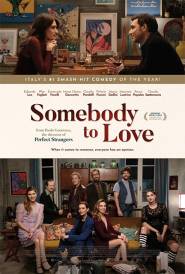Samuel L. Jackson - Freedomland Interview
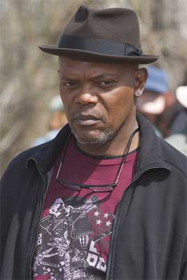
by Paul Fischer in New York.
Paul Fischer: What sets this particular guy apart from other characters that you have played and what was it about him that you thought this is interesting, this is the one?
Samuel L Jackson: Wow. Well you know movies fall into certain categories so I?ve consequently played a lot of different cops from a lot of different kind of law enforcement agencies. A cop like Lorenzo is a 20 year Vet who has a very real connection to this housing project and in my mind or in my back story he grew up in those projects, so he knows all those people, he?s been in their houses, grown up with some of their kids, he?s arrested some of them, he has stopped some of them going to jail. So he has that very real connection and he has a real connection to his job because he has been on it for 20 years and all of a sudden he is put in this position where you know they are asking him that question are you going to be black or blue at this point, and the people over here are putting pressure on him and the people over here are putting pressure on him, and he discovers this person on the inside of it that is a real victim that he has to kind of handle in a specific kind of way to get to the truth of what is going on, and in prior derivations of the script Lorenzo didn?t have all those things to do. So all of a sudden it seemed like a very appealing kind of challenge for me the actor to kind of get into.
Paul Fischer: How helpful is it to have a book to draw from?
Samuel L Jackson: You know I read that book like 6 years ago and I kind of forgot about it, because I read the book the first time the script came around. It was a lot more helpful to actually have Calvin the cop it was kind of like my template to call upon. He was actually the Technical Advisor on Shaft and then this time I kind of got to go to Jersey City with him and hang around and watch him interact with other cops, people in the community, people in projects and see what it means to be what he is. I mean people call him ?big daddy? and he?s like this larger than life kind of hero to a lot of people...
Paul Fischer: How did the impact of the housing project realm affect you and did you ever live in that kind of environment?
Samuel L Jackson: I lived in the housing all my life. I had relatives who lived in the projects in Tennessee when I was growing up, and I grew up around...well not grew up but spent time in an out of projects when I was in Atlanta in college...Moore House College sits in the middle of some projects and I interacted with the guys that lived in there and when I got to New York I lived in Harlem and there was huge high rise projects all around and I spent time in [inaudible suburb] and Chicago so I know what housing projects are, and when...I guess when a crime happens in an area like that the immediate thought is okay it?s ...somebody black did it cause black people live there and nobody stops to think that they live in these places because that?s the economic strata that they?re on, but you know 80% of those people still go to work everyday and do the same things that everybody else does. But when you go in there you immediately thing black okay it is a high crime area so the majority of people that live in there are criminals and when you go in with that mind set you tend to treat the people less than human and the people tend to push back and you push a little bit more an it doesn?t take a lot to set off a spark like that riot you know that happens in the film.
Paul Fischer: There was so much intensity going on in Freedomland. Is it a release for you to go from that to something like the Snakes on Plane a movie where you don?t have to...
Samuel L Jackson: Where I don?t have to think about it?
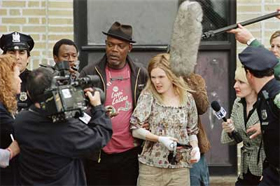 Paul Fischer: Right.
Paul Fischer: Right.
Samuel L Jackson: Actually you know we had a great time on this film. I tend to see movie sets as a fun kind of playground and all the stuff that I need to know and do I prepared myself to do. Interestingly enough Julianne is almost like a mirror image of me. So when we got through with the rehearsal process and we were ready to go and when we got to set Julianne and I could stand there and talk about baseball, basketball, her kids and I think at the time she was real caught up in American Idol and she was watching it all the time so she was talking about ?oh and Bo was so good today I really hope he stays tonight an it is going to be so good?. So she would go in an out of it like you know boom, boom, boom so we had just such a great time. But to answer your question in another was I do still like doing films that are just kind of visceral thrills that I use to go an see when I was kid you know you know what is going to happen so when I open that script that day an it said Snakes on a Plane I went, ?I don?t even need to do read this, I?ll do this?, you know if it is what I think it is I am going to do it! You know...
Paul Fischer: So is the title of the film the same apparently they changed it every other week?
Samuel L Jackson: No, no, no it?s Snakes on a Plane. They finally figured out that okay that is the title that is going to work. Pacific Flight 121 was not interesting.
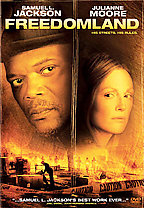 Paul Fischer: What is it like to be upstaged by a snake?
Paul Fischer: What is it like to be upstaged by a snake?
Samuel L Jackson: I don?t know we?ll talk about that when we get to that junket [laughter].
Paul Fischer: You were talking about Julianne on an off camera but one thing that struck me is that there is a lot of dialogue, in fact I guess she has pages of dialogue without anybody else interrupting and we?ve...I think that like her you are an actor who appreciates the value of stillness. So is it a different challenge when you realise okay that are long speeches in this, we have to deal with words and not just the physical?
Samuel L Jackson: No it is kind of fun. To actually be able to express how you feel and not have a quick camera cut do it for you or to stand there and talk to another actor about yourself or about what is going on around you and get something from that actor that allows you to get to the next space in that particular speech, to actually stop and have a real conversation and have a director that is not afraid to let you do it in a conversational kind of pace, is great. That?s not like ?okay we need to do this in like 2 minutes cause I want to cut this? and nah he never talks about that kind of stuff. It is kind of like okay let it play out the way you want to play out and sometimes it was you know you can stop and think about that long it is okay, you know just do it, and it is so refreshing to be able to do that.
Paul Fischer: Sam, you seem to be incredible busy I mean I seem to seem you several times throughout the year...
Samuel L Jackson: I hope so...
Paul Fischer: What drives you to work as hard as you do?
Samuel L Jackson: Well I like my job. I mean I am an actor and I always think actors should act. You go to work as often as you possibly can. If I had my way I?d do film, television, theatre whatever, it just so happens my agent and managers seem to think I should continue to do films. Hopefully I will be like Michael Caine and I?ll find roles that fit what I can do in my age ranges and I?ll still be able to do them. But I actually grew up in a household of people that went to work everyday, so when I was a kid somebody in my house was going to work everyday and I think that is what adults do, adults go to work, and I happen to have a very kind of cool job I can actually go to work and go back to bed and nobody cares. I have a bed in my dressing room it is kind of like, ?where?s Sam??, ?he?s asleep?, ?oh that?s great? you know.
Paul Fischer: So you don?t mind not necessarily stepping on toes but stepping into mine fields. I thought is was an interesting choice to do a voice in The Boondocks
Samuel L Jackson: Well you know there are things that I like that I want to be a part of and I?ve always loved the comic strip and you know Erin has always been like a champion of mine. I remember he did this one comic strip about Mace Windu when I got the job in Star Wars for the first time and those kids were saying they?d better not kill him. I kind of like that idea cause I wanted to be in all 3 of them too. So you know it is kind of like some payback. Things you like you want to do, I mean I like Law an Order and CSI. I did Law an Order before I left New York when it was just one Law an Order. But you know I like things like CSI and The Wire and The Sopranos and you know Deadwood and if I had my choice I would find away to be on those shows cause I like them.
Paul Fischer: So were you able to get any info out of Edie Falco about The Sopranos?
Samuel L Jackson: None, none. We knew that not to bother her about that, she wasn?t going to tell us.
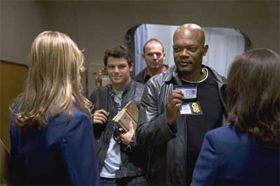 Paul Fischer: Have you wrapped Black Snake Moan?
Paul Fischer: Have you wrapped Black Snake Moan?
Samuel L Jackson: Black Snake Moan yeah. Yeah we finished in December. Paul Fischer: And next for you?
Samuel L Jackson: Next? I am about to start a film called Home of the Brave about soldiers coming home from Iraq and you know civil re adjustment and how difficult that.
Paul Fischer: So what will your fantasy television series look like if somebody came to you with an offer? Would you want to do if it were say passed ?
Samuel L Jackson: Wow. It would probably be like Have Gun ? Will Travel use to be, you know cause I use to really love Mr Paladin even though I got older and I started trying to figure out how long would it actually have taken him to get from San Francisco to Ohio to help somebody once he saw that add in the paper, you know but he had to take a stage coach so you read something and then 6 months later you show up and go and oh is that problem still going. But Have Gun - Will Travel kind of crossed with CSI you know kind of crossed with Deadwood...
Paul Fischer: In Black Snake Moan you play a blues man. Is it based on any famous blues man of the past?
Samuel L Jackson: No.
Paul Fischer: So you didn?t base your character on anyone real that you might have admired?
Samuel L Jackson: No.
Paul Fischer: Are you a fan of the blues?
Samuel L Jackson: Yeah actually. A bigger fan now I mean I spent a lot of time with the guys in the Delta you know, I had to learn to play guitar so I spent a lot of time with these guys in the Delta these old guys so they taught me some interesting kind of guitar licks and actually got to play and sing with guys like Big Jack Johnson so it was very cool.
Paul Fischer: You sing in the movie?
Samuel L Jackson: I sing and play in the movie yeah.
Paul Fischer: Where they affected by the storms in the area that...
Samuel L Jackson: Yeah, there were a lot of people affected. Most of the people that I saw in Memphis came out of the Mississippi Delta we didn?t get a lot of people from Louisiana but further down in the Mississippi Delta there were a lot of people affected and I ran into people in you know restaurants that were just kind of there and you know taking care of their kids and doing stuff and you know you do what you can that is all...everybody was giving me some grief at one point about something I said about The Red Cross but I was kind of...I?d see people in restaurants and I will just give people a lot of money and say make sure all these people you know get fed and don?t charge them for their meals I?m just going to go about my business, and that is the kind of thing that you can do that lets you know that you are doing something that makes some sense to people or just hand people money in a parking lot because you saw them with their kids and they are just kind of looking around looking lost. But the blues most of them were okay. You know these guys are survivors they know how to take care of themselves, and interestingly enough the guys that I met aren?t like big stars, well they?re stars in their little areas because they still have like juke joints that guys like take all the furniture out of their house on the weekends and invite people in and charge them $10 and they play and they got there little 3 man band and people come and kick it and it was interesting being down in there, it was great.
.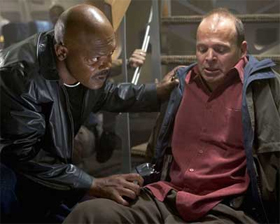 Paul Fischer: What?s if like doing scene work with your wife [La Tanya Richardson?
Paul Fischer: What?s if like doing scene work with your wife [La Tanya Richardson?
Samuel L Jackson: Different. Actually we hadn?t really worked together since Losing Isaiah and you know that was kind of early on in both our kind of cinematic careers and things have changed a little bit since then. You know that was time when she was the more experienced person when I first started acting cause she has been acting since she was a child, and you know as time has gone on I have kind of done a little bit more in different places. So for her to come on this particular set was sort of like a culture shock. She knows...she had an idea I guess about how that all works cause she was in US Marshalls with Tommy Lee Jones and Wesley and all those guys, and Wesley had like his little village full of trailers and people and all that stuff. But with me I don?t know what she expected but she got to her trailer and it was very different from mine, and you know the treatment on set and off set is very different for number one as opposed to number whatever, and occasionally I let her ride in my car from trailer land to set...
Paul Fischer: Oh that was nice...
Samuel L Jackson: You got to keep them in their place though, you can?t let them get use to that.
Paul Fischer: So, congratulations on putting your hands and feet in cement. What was that experience like for you?
Samuel L Jackson: [Laughter] being able to put my hands and feet in cement at Grauman?s was you know it is kind of surreal but I actually have this thing where I?m always saying well I am not a movie star I am an actor you know, I just happen to be an actor who is very popular and I made some films that have made some money, and a lot of times your asked a question about, ?do you really need an Academy Award, or do you feel like your career is not complete unless you have one?? Well I don?t think I need an Academy Award to validate the things that I have done, but that?s like the award for being the best person at whatever you did for that particular year. But the hands and feet ceremonies is one of the things you watched when you were growing up and you saw the kind of people that were putting their hands an feet in cement that represented specifically what Hollywood was and the largeness of your popularity and the kind of people that represent you know ?Hollywood Stardom? and it is more of an elite kind of club than I think the Academy Award club, and it gave me a great sense of pride and sort of speechlessness to know that there I was doing something that I watched James Cagney and you know people that...Hollywood icons do and it kind of make you admit to yourself you know okay maybe I am a movie star you know.
Paul Fischer: What does that feel like to stick your hands in there?
Samuel L Jackson: It was kind of cool and kind of okay. Well somebody is pressing down on your hands to make sure you?ve got a good impression and you know it is kind of like wow! I mean it is great people are taking your picture...
Paul Fischer: Does it kind of kind of remind you where you are now and where you?ve come from to get to that point? Were you able to do that?
Samuel L Jackson: I didn?t renumerate or reflect in that kind of way. I was just kinda odd by the whole process you know. Because you are there and you are putting your hands down and you can see the names of other people in front of you and around as you are doing it you know and it is kind of like man I am getting ready to be with all these people and you are putting your name down and then you get up and you are putting your feet in it and you are still standing there and you see all these things around you, you know that there are only 230 some people there and you know, and even more interesting than that I think I am maybe the seventh African American to do it so it is pretty important.
Paul Fischer: Not too far from the Chinese theatre something else happened recently that I?ve got to ask you about. You worked with Lee Tamahori a couple of years ago. What does that do to somebody?s career, I mean not that you could predict the future.
Samuel L Jackson: Pretty much nothing I mean you know I mean nobody got hurt that is the important thing. You know guys are guys and people are people and if Brokeback Mountain can be the best movie of the year then that means Lee can continue to direct as long as he wants to.
JACKSON TAKES ON A DIFFERENT COP ROLE.
Sam Jackson loves to work, and remains as passionate about every film he does. Ingratiating, funny and charming to the press, Jackson knows how to effortlessly work the room. From an asthmatic cop to an FBI agent battling snakes, there?s only one Samuel L. Jackson. Paul Fischer caught up with him in New York.Paul Fischer: What sets this particular guy apart from other characters that you have played and what was it about him that you thought this is interesting, this is the one?
Samuel L Jackson: Wow. Well you know movies fall into certain categories so I?ve consequently played a lot of different cops from a lot of different kind of law enforcement agencies. A cop like Lorenzo is a 20 year Vet who has a very real connection to this housing project and in my mind or in my back story he grew up in those projects, so he knows all those people, he?s been in their houses, grown up with some of their kids, he?s arrested some of them, he has stopped some of them going to jail. So he has that very real connection and he has a real connection to his job because he has been on it for 20 years and all of a sudden he is put in this position where you know they are asking him that question are you going to be black or blue at this point, and the people over here are putting pressure on him and the people over here are putting pressure on him, and he discovers this person on the inside of it that is a real victim that he has to kind of handle in a specific kind of way to get to the truth of what is going on, and in prior derivations of the script Lorenzo didn?t have all those things to do. So all of a sudden it seemed like a very appealing kind of challenge for me the actor to kind of get into.
Paul Fischer: How helpful is it to have a book to draw from?
Samuel L Jackson: You know I read that book like 6 years ago and I kind of forgot about it, because I read the book the first time the script came around. It was a lot more helpful to actually have Calvin the cop it was kind of like my template to call upon. He was actually the Technical Advisor on Shaft and then this time I kind of got to go to Jersey City with him and hang around and watch him interact with other cops, people in the community, people in projects and see what it means to be what he is. I mean people call him ?big daddy? and he?s like this larger than life kind of hero to a lot of people...
Paul Fischer: How did the impact of the housing project realm affect you and did you ever live in that kind of environment?
Samuel L Jackson: I lived in the housing all my life. I had relatives who lived in the projects in Tennessee when I was growing up, and I grew up around...well not grew up but spent time in an out of projects when I was in Atlanta in college...Moore House College sits in the middle of some projects and I interacted with the guys that lived in there and when I got to New York I lived in Harlem and there was huge high rise projects all around and I spent time in [inaudible suburb] and Chicago so I know what housing projects are, and when...I guess when a crime happens in an area like that the immediate thought is okay it?s ...somebody black did it cause black people live there and nobody stops to think that they live in these places because that?s the economic strata that they?re on, but you know 80% of those people still go to work everyday and do the same things that everybody else does. But when you go in there you immediately thing black okay it is a high crime area so the majority of people that live in there are criminals and when you go in with that mind set you tend to treat the people less than human and the people tend to push back and you push a little bit more an it doesn?t take a lot to set off a spark like that riot you know that happens in the film.
Paul Fischer: There was so much intensity going on in Freedomland. Is it a release for you to go from that to something like the Snakes on Plane a movie where you don?t have to...
Samuel L Jackson: Where I don?t have to think about it?
 Paul Fischer: Right.
Paul Fischer: Right.Samuel L Jackson: Actually you know we had a great time on this film. I tend to see movie sets as a fun kind of playground and all the stuff that I need to know and do I prepared myself to do. Interestingly enough Julianne is almost like a mirror image of me. So when we got through with the rehearsal process and we were ready to go and when we got to set Julianne and I could stand there and talk about baseball, basketball, her kids and I think at the time she was real caught up in American Idol and she was watching it all the time so she was talking about ?oh and Bo was so good today I really hope he stays tonight an it is going to be so good?. So she would go in an out of it like you know boom, boom, boom so we had just such a great time. But to answer your question in another was I do still like doing films that are just kind of visceral thrills that I use to go an see when I was kid you know you know what is going to happen so when I open that script that day an it said Snakes on a Plane I went, ?I don?t even need to do read this, I?ll do this?, you know if it is what I think it is I am going to do it! You know...
Paul Fischer: So is the title of the film the same apparently they changed it every other week?
Samuel L Jackson: No, no, no it?s Snakes on a Plane. They finally figured out that okay that is the title that is going to work. Pacific Flight 121 was not interesting.
 Paul Fischer: What is it like to be upstaged by a snake?
Paul Fischer: What is it like to be upstaged by a snake?Samuel L Jackson: I don?t know we?ll talk about that when we get to that junket [laughter].
Paul Fischer: You were talking about Julianne on an off camera but one thing that struck me is that there is a lot of dialogue, in fact I guess she has pages of dialogue without anybody else interrupting and we?ve...I think that like her you are an actor who appreciates the value of stillness. So is it a different challenge when you realise okay that are long speeches in this, we have to deal with words and not just the physical?
Samuel L Jackson: No it is kind of fun. To actually be able to express how you feel and not have a quick camera cut do it for you or to stand there and talk to another actor about yourself or about what is going on around you and get something from that actor that allows you to get to the next space in that particular speech, to actually stop and have a real conversation and have a director that is not afraid to let you do it in a conversational kind of pace, is great. That?s not like ?okay we need to do this in like 2 minutes cause I want to cut this? and nah he never talks about that kind of stuff. It is kind of like okay let it play out the way you want to play out and sometimes it was you know you can stop and think about that long it is okay, you know just do it, and it is so refreshing to be able to do that.
Paul Fischer: Sam, you seem to be incredible busy I mean I seem to seem you several times throughout the year...
Samuel L Jackson: I hope so...
Paul Fischer: What drives you to work as hard as you do?
Samuel L Jackson: Well I like my job. I mean I am an actor and I always think actors should act. You go to work as often as you possibly can. If I had my way I?d do film, television, theatre whatever, it just so happens my agent and managers seem to think I should continue to do films. Hopefully I will be like Michael Caine and I?ll find roles that fit what I can do in my age ranges and I?ll still be able to do them. But I actually grew up in a household of people that went to work everyday, so when I was a kid somebody in my house was going to work everyday and I think that is what adults do, adults go to work, and I happen to have a very kind of cool job I can actually go to work and go back to bed and nobody cares. I have a bed in my dressing room it is kind of like, ?where?s Sam??, ?he?s asleep?, ?oh that?s great? you know.
Paul Fischer: So you don?t mind not necessarily stepping on toes but stepping into mine fields. I thought is was an interesting choice to do a voice in The Boondocks
Samuel L Jackson: Well you know there are things that I like that I want to be a part of and I?ve always loved the comic strip and you know Erin has always been like a champion of mine. I remember he did this one comic strip about Mace Windu when I got the job in Star Wars for the first time and those kids were saying they?d better not kill him. I kind of like that idea cause I wanted to be in all 3 of them too. So you know it is kind of like some payback. Things you like you want to do, I mean I like Law an Order and CSI. I did Law an Order before I left New York when it was just one Law an Order. But you know I like things like CSI and The Wire and The Sopranos and you know Deadwood and if I had my choice I would find away to be on those shows cause I like them.
Paul Fischer: So were you able to get any info out of Edie Falco about The Sopranos?
Samuel L Jackson: None, none. We knew that not to bother her about that, she wasn?t going to tell us.
 Paul Fischer: Have you wrapped Black Snake Moan?
Paul Fischer: Have you wrapped Black Snake Moan?Samuel L Jackson: Black Snake Moan yeah. Yeah we finished in December. Paul Fischer: And next for you?
Samuel L Jackson: Next? I am about to start a film called Home of the Brave about soldiers coming home from Iraq and you know civil re adjustment and how difficult that.
Paul Fischer: So what will your fantasy television series look like if somebody came to you with an offer? Would you want to do if it were say passed ?
Samuel L Jackson: Wow. It would probably be like Have Gun ? Will Travel use to be, you know cause I use to really love Mr Paladin even though I got older and I started trying to figure out how long would it actually have taken him to get from San Francisco to Ohio to help somebody once he saw that add in the paper, you know but he had to take a stage coach so you read something and then 6 months later you show up and go and oh is that problem still going. But Have Gun - Will Travel kind of crossed with CSI you know kind of crossed with Deadwood...
Paul Fischer: In Black Snake Moan you play a blues man. Is it based on any famous blues man of the past?
Samuel L Jackson: No.
Paul Fischer: So you didn?t base your character on anyone real that you might have admired?
Samuel L Jackson: No.
Paul Fischer: Are you a fan of the blues?
Samuel L Jackson: Yeah actually. A bigger fan now I mean I spent a lot of time with the guys in the Delta you know, I had to learn to play guitar so I spent a lot of time with these guys in the Delta these old guys so they taught me some interesting kind of guitar licks and actually got to play and sing with guys like Big Jack Johnson so it was very cool.
Paul Fischer: You sing in the movie?
Samuel L Jackson: I sing and play in the movie yeah.
Paul Fischer: Where they affected by the storms in the area that...
Samuel L Jackson: Yeah, there were a lot of people affected. Most of the people that I saw in Memphis came out of the Mississippi Delta we didn?t get a lot of people from Louisiana but further down in the Mississippi Delta there were a lot of people affected and I ran into people in you know restaurants that were just kind of there and you know taking care of their kids and doing stuff and you know you do what you can that is all...everybody was giving me some grief at one point about something I said about The Red Cross but I was kind of...I?d see people in restaurants and I will just give people a lot of money and say make sure all these people you know get fed and don?t charge them for their meals I?m just going to go about my business, and that is the kind of thing that you can do that lets you know that you are doing something that makes some sense to people or just hand people money in a parking lot because you saw them with their kids and they are just kind of looking around looking lost. But the blues most of them were okay. You know these guys are survivors they know how to take care of themselves, and interestingly enough the guys that I met aren?t like big stars, well they?re stars in their little areas because they still have like juke joints that guys like take all the furniture out of their house on the weekends and invite people in and charge them $10 and they play and they got there little 3 man band and people come and kick it and it was interesting being down in there, it was great.
.
 Paul Fischer: What?s if like doing scene work with your wife [La Tanya Richardson?
Paul Fischer: What?s if like doing scene work with your wife [La Tanya Richardson?Samuel L Jackson: Different. Actually we hadn?t really worked together since Losing Isaiah and you know that was kind of early on in both our kind of cinematic careers and things have changed a little bit since then. You know that was time when she was the more experienced person when I first started acting cause she has been acting since she was a child, and you know as time has gone on I have kind of done a little bit more in different places. So for her to come on this particular set was sort of like a culture shock. She knows...she had an idea I guess about how that all works cause she was in US Marshalls with Tommy Lee Jones and Wesley and all those guys, and Wesley had like his little village full of trailers and people and all that stuff. But with me I don?t know what she expected but she got to her trailer and it was very different from mine, and you know the treatment on set and off set is very different for number one as opposed to number whatever, and occasionally I let her ride in my car from trailer land to set...
Paul Fischer: Oh that was nice...
Samuel L Jackson: You got to keep them in their place though, you can?t let them get use to that.
Paul Fischer: So, congratulations on putting your hands and feet in cement. What was that experience like for you?
Samuel L Jackson: [Laughter] being able to put my hands and feet in cement at Grauman?s was you know it is kind of surreal but I actually have this thing where I?m always saying well I am not a movie star I am an actor you know, I just happen to be an actor who is very popular and I made some films that have made some money, and a lot of times your asked a question about, ?do you really need an Academy Award, or do you feel like your career is not complete unless you have one?? Well I don?t think I need an Academy Award to validate the things that I have done, but that?s like the award for being the best person at whatever you did for that particular year. But the hands and feet ceremonies is one of the things you watched when you were growing up and you saw the kind of people that were putting their hands an feet in cement that represented specifically what Hollywood was and the largeness of your popularity and the kind of people that represent you know ?Hollywood Stardom? and it is more of an elite kind of club than I think the Academy Award club, and it gave me a great sense of pride and sort of speechlessness to know that there I was doing something that I watched James Cagney and you know people that...Hollywood icons do and it kind of make you admit to yourself you know okay maybe I am a movie star you know.
Paul Fischer: What does that feel like to stick your hands in there?
Samuel L Jackson: It was kind of cool and kind of okay. Well somebody is pressing down on your hands to make sure you?ve got a good impression and you know it is kind of like wow! I mean it is great people are taking your picture...
Paul Fischer: Does it kind of kind of remind you where you are now and where you?ve come from to get to that point? Were you able to do that?
Samuel L Jackson: I didn?t renumerate or reflect in that kind of way. I was just kinda odd by the whole process you know. Because you are there and you are putting your hands down and you can see the names of other people in front of you and around as you are doing it you know and it is kind of like man I am getting ready to be with all these people and you are putting your name down and then you get up and you are putting your feet in it and you are still standing there and you see all these things around you, you know that there are only 230 some people there and you know, and even more interesting than that I think I am maybe the seventh African American to do it so it is pretty important.
Paul Fischer: Not too far from the Chinese theatre something else happened recently that I?ve got to ask you about. You worked with Lee Tamahori a couple of years ago. What does that do to somebody?s career, I mean not that you could predict the future.
Samuel L Jackson: Pretty much nothing I mean you know I mean nobody got hurt that is the important thing. You know guys are guys and people are people and if Brokeback Mountain can be the best movie of the year then that means Lee can continue to direct as long as he wants to.
MORE




